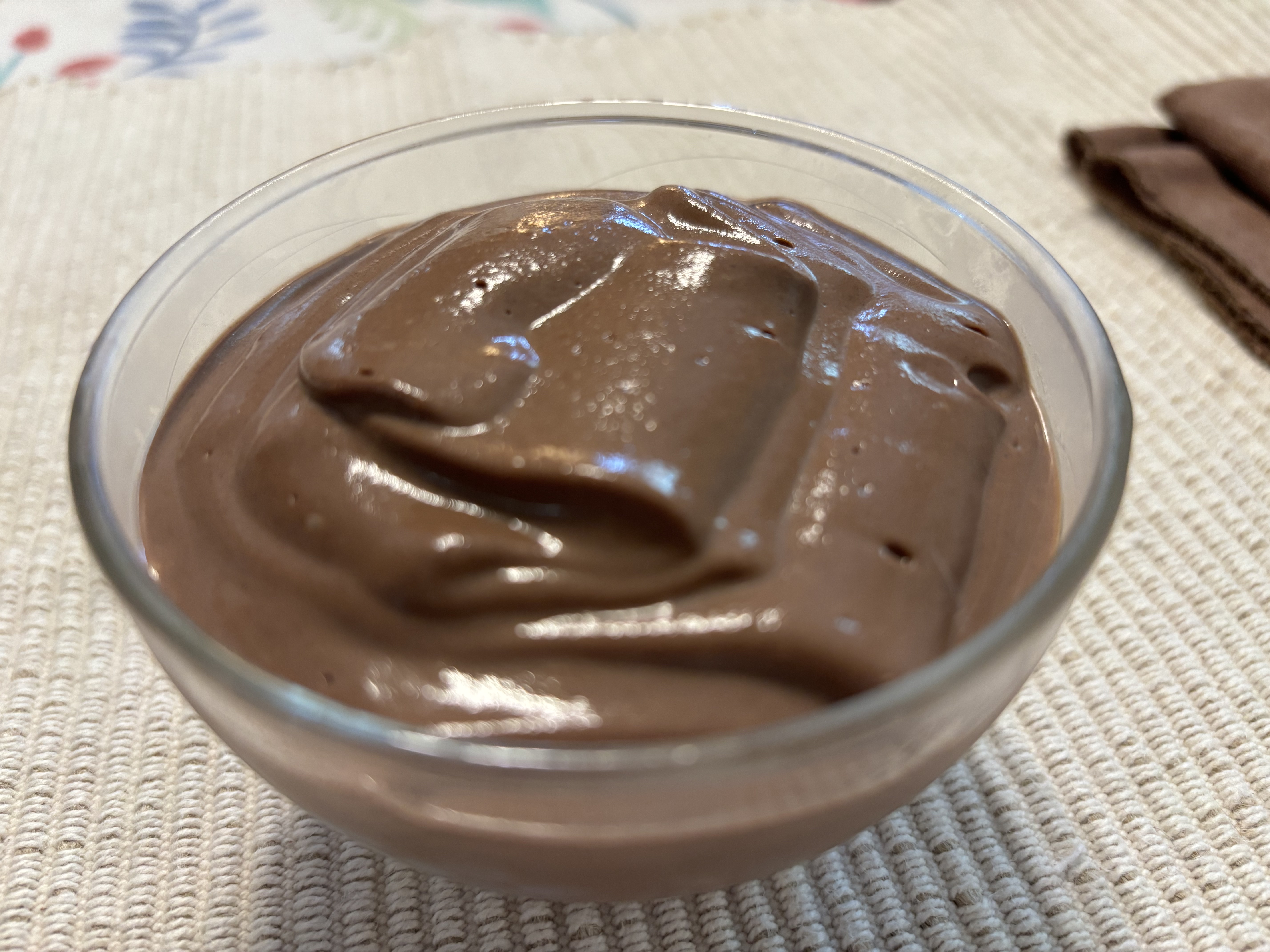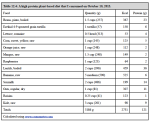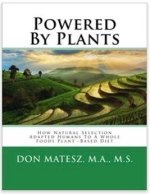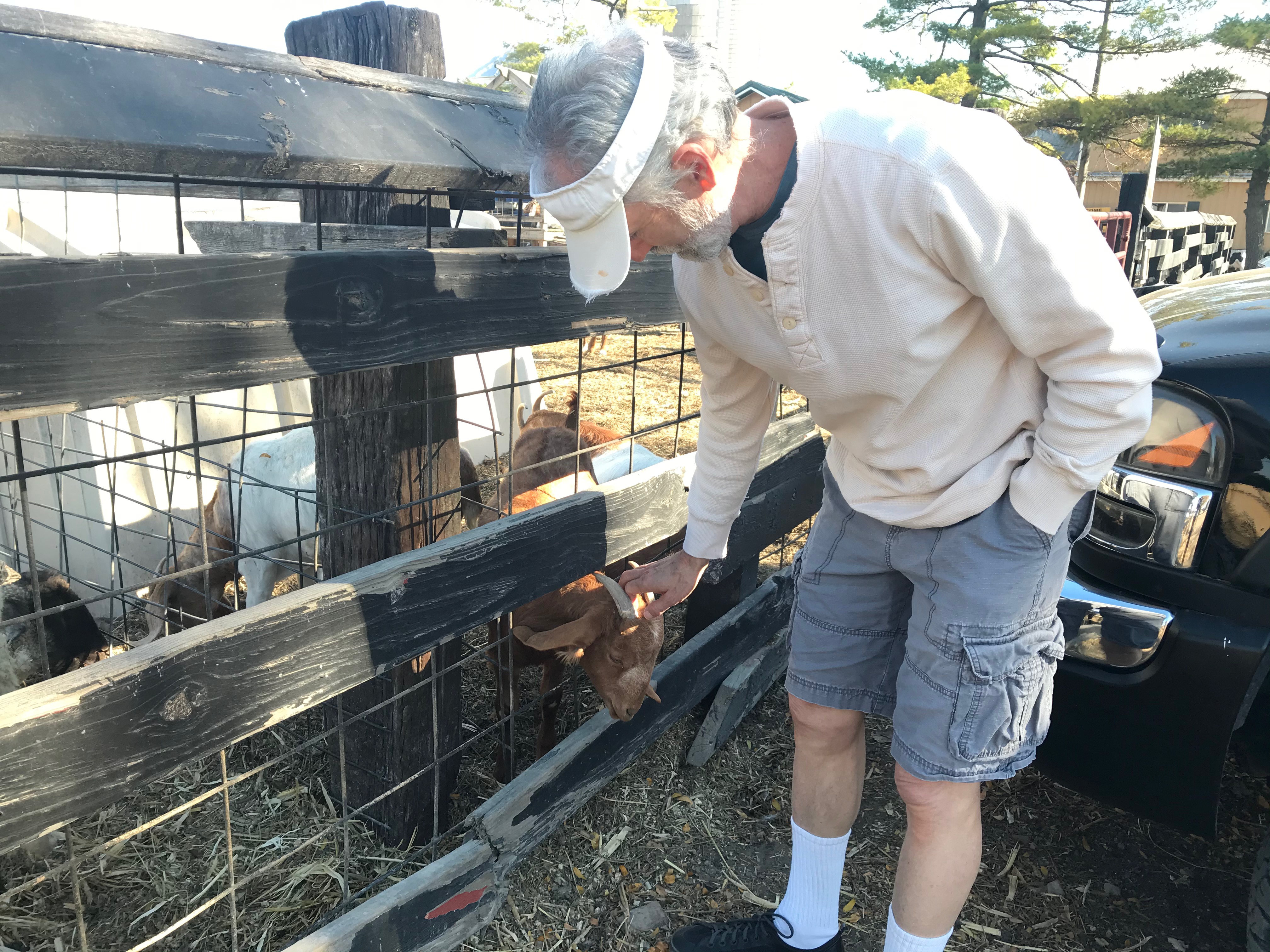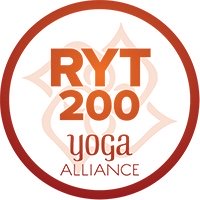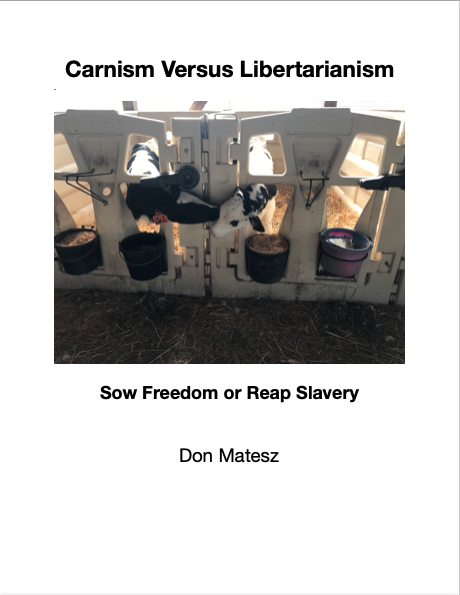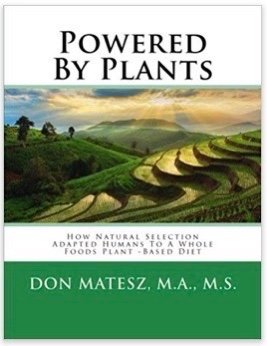My Diet For Psoriasis - An Update
Since I resumed a primarily whole foods plant-based vegan diet in late 2022 many people may have wondered how it has affected my psoriasis.
A Mistake Leads To Learning
In Chapter 12 (page 159) of Powered By Plants I presented evidence indicating that a protein intake of 0.8 g/kg per day is sufficient for both people eating plant based diets and athletes. Nevertheless, in 2013 I aimed to consume a higher protein diet, hedging my bets based on claims that people involved in resistance training need or at least would benefit from such protein intake to build and maintain muscle mass. To illustrate how one could consume a strictly plant-based diet providing protein at 1.6 g/kg/d, I included Table 12.4 which presented the foods that I had consumed on one day in October of 2013:
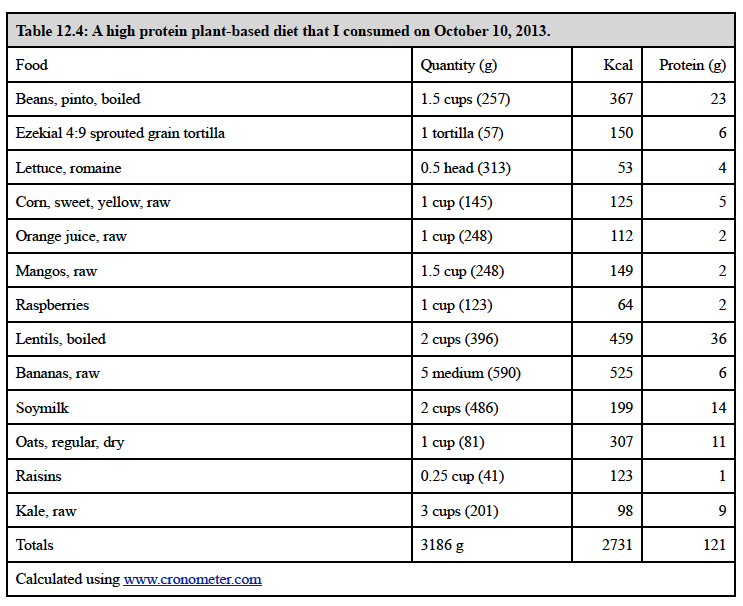
When I initially resumed a primarily whole foods plant-based vegan diet in late 2022, I continued to aim to consume a high protein diet providing 1.2–1.6 g/kg protein daily. As I had done previously, to achieve this high protein intake I consumed large portions of legumes and legume products, including tofu, tempeh, texturized soy protein, and pea and soy protein powders. On a typical day I would consume 1-2 cups of soy milk, 1-2 cups of whole beans, peas or lentils daily, and often included 8 ounces of tofu, wheat gluten or texturized soy protein, and/or 1-2 ounces of pea or soy protein.
Advocates of high animal protein diets typically claim high protein diets are harmless and certainly have no impact on skin health. However, there is considerable evidence that high animal protein diets do harm the kidneys. I developed lower limb edema after several years on a high animal protein diet, and reversed it by removing animal protein from my diet.
According to the Western 'scientific' research I cited in my article about how I reversed foot swelling (lower limb edema), plant protein is less harmful if not harmless in large doses, so despite the fact that this over-emphasis on beans and bean products caused me some digestive grief, consisting of gas and bloating, I ate a high plant protein diet because I believed I needed or benefitted from the extra protein.
As this proceeded, during the first 5-6 months, the psoriasis in my ears got much worse. This didn't really surprise me because it had gotten worse during my previous time eating a vegan diet high in plant protein (see below). I just hadn't figured out what about my whole foods plant-based diet was causing the condition to deteriorate, and I had no intention of returning to eating animals.
During this time I completed my yoga teacher certification and began studying Ayurveda for a certification course. I had previously studied Ayurveda but not with the focus required for this certification (which I completed). Ayurvedic medicine recommends a vegetarian diet in accord with the ethical principle of ahimsa (non-harming, non-violence, non-aggression), but recognizes that to support good health, one's diet must be adjusted to fit one's individual constitution. According to Ayurvedic medicine, there exist three basic constitutional types, each dominated by one of three doshas:
- Vata dosha consists of space, air, and ether, which together allow all things to move. The Sanskrit word vata literally means wind. In the human body, vata produces movements, such as respiration, heartbeat, and bowel movements. Vata is seated in the lower part of the large intestine. Vata also manifests in the movements of the mind.
- Pitta dosha consists of fire and energy, which together allow the manifestation of conversion and transformation. The Sanskrit word “pitta” literally means “that which cooks or transforms things.” In nature, pitta is the agency or force of transformation, i.e. it causes changes in temperature, form, appearance, or taste. In the human body, pitta produces digestion and metabolism, which transform food into body tissue and heat. Pitta is seated in the sweat and blood. Pitta also governs perception, which is the illuminating power of the mind, and cognition, which transforms information.
- Kapha dosha is the agency of cold, cohesion and condensation. The Sanskrit word “kapha” means “that which gets activated by water.” (The English word “cough” is etymologically related to “kapha.”) The kapha dosha consists of earth and water elements, which together function to store and preserve. Just as water droplets attract and adhere to one another, kapha draws things together into a fluid form; this is why the body consists primarily of water.
Click here for a questionnaire to enable you do determine your dosha. I have a strong vata dosha component to my constitution, and, since legumes aggravate vata (wind), they are not recommended for people like myself.
About this time, Tracy and I received a gift of books on macrobiotics. I studied, practiced and taught macrobiotics for about a decade prior to getting distracted into animal-based diet ideologies. During that decade I even worked for a year as a live-in macrobiotic cook for a couple in Seattle, Washington, and published one article on macrobiotic cooking in Vegetarian Times:

I also published several articles on macrobiotic theory and practice in Macrobiotics Today.

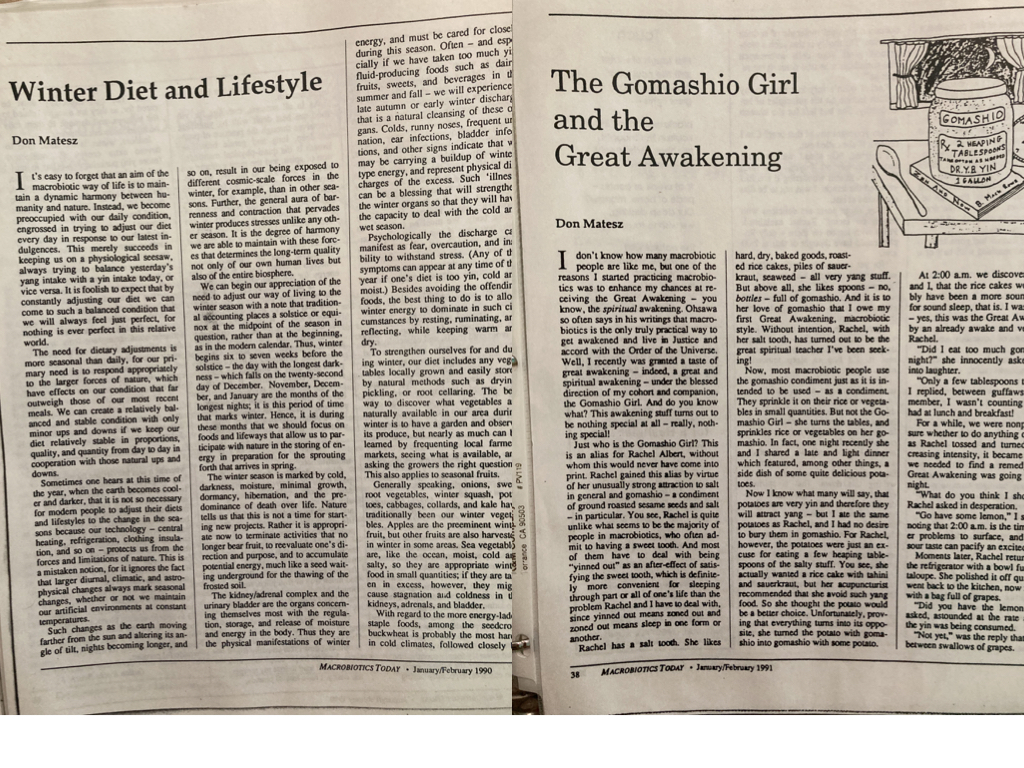
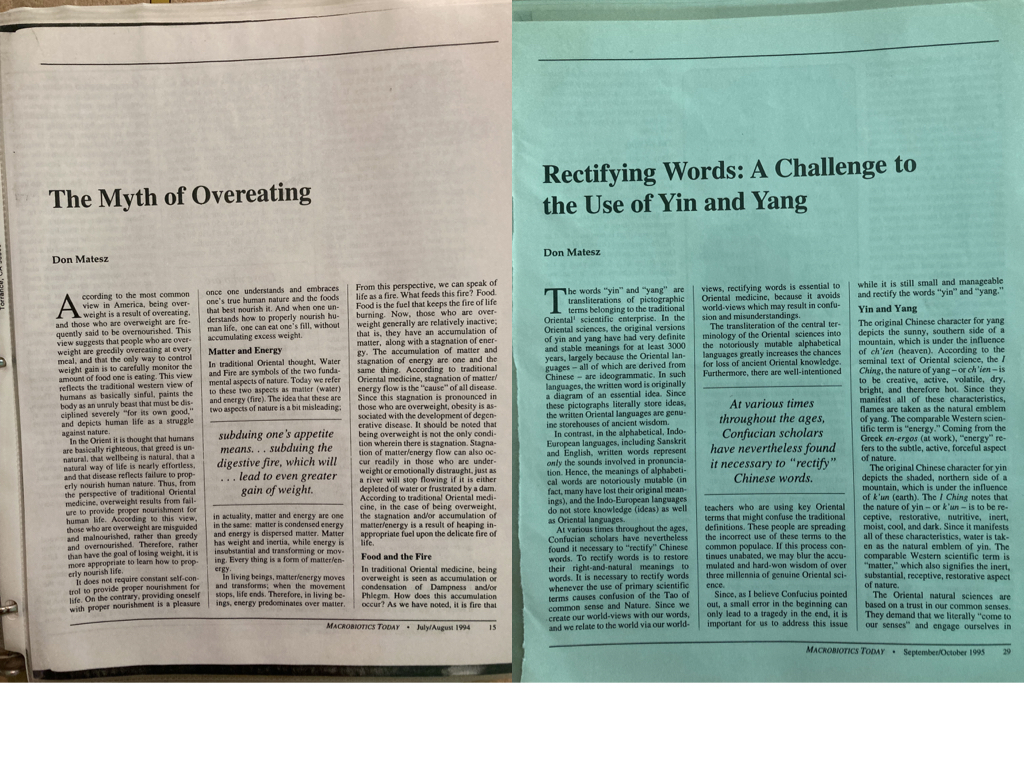
This reminded me that according to principles of macrobiotic medicine, excess dietary protein from any source can cause various diseases, particularly skin diseases. When one consumes excess protein the liver and kidneys have to deal with excretion of the excess nitrogen, sulfur, and acids produced from the de-amination of the unused amino acids. The toxic wastes get circulated in the blood, affecting all tissues until they are finally excreted by the kidneys. Since the kidneys can only excrete these wastes at a limited rate, depending on the total protein intake, the excess might build up in the blood, then the skin as the body tries to excrete the wastes through the skin. Since the skin also has a limited ability to excrete these wastes, they might also gradually build up in the skin, which might cause the skin to malfunction, producing common skin diseases such as eczema, acne, and psoriasis, to name a few.
Recovering My Knowledge
During this time I was also taking a medical I Ching class for people involved in Taoist health care and longevity arts. Friends in the class reminded me that, according to Taoist medicine, the ears represent the kidneys. There are several empirical reasons for this relationship, among them being the fact that the external ears resemble the kidneys, but this article is not an explanation of the empirical foundations of Chinese medicine. My classmates further reminded me that the fact that I have had psoriasis in my ears and along the urinary bladder channel on my scalp indicates that the root of the skin disorders in those locations could be in my kidneys, and that the associated itching represents the influence of internal wind.
The most important point here is that although I knew these Oriental medical principles, by virtue of having a master of science in Oriental medicine (MSOM), and national board certification in Oriental medicine, and I regularly applied them in my clinical practice as a Oriental medicine provider, I had for years mostly ignored them in my attempt to understand my own skin disease. This resulted from my unconsciously internalizing the ignorant perspective held by advocates of Western culture and 'science' that Oriental medicine is unscientific. Although trained to practice Oriental medicine, and abundantly aware of the irrationality and failures of Western 'medicine,' at least with regard to understanding prevention and treatment of degenerative diseases, like all other members of 'Westernized' societies I have been deeply programmed to believe that the Western way of thinking is supreme, and it has been difficult to break out of this programming because it is constantly reinforced by both conscious and unconscious agents of the Western 'scientific' and cultural paradigm.
When these learning experiences enabled me to integrate my knowledge of the complementary Ayurvedic, Oriental medicine and macrobiotic principles, it became clear that these traditional medical theories could, unlike Western 'scientific' medicine, clearly explain why my psoriasis occurred in its characteristic pattern and got worse on a high plant protein diet:
- I could be eating excess protein, which results in excess urea production, which might be making my blood mildly toxic (mildly uremic) and stresses the liver and kidneys. Excess urea in blood (uremia) irritates the skin, causing itching (see image from Cleveland Clinic below) and when the kidneys are stressed, this causes disorders to appear in the ears or along the anatomical pathways or regions governed by the kidneys or urinary bladder.
- I was eating large amounts of legumes, which are by nature drying and aggravate vata (wind); for example, for many if not all people, eating legumes results in intestinal gas, traditionally recognized as wind; and itching is a sign of a build up of wind in the body, released through the skin.
- I might also have been consuming an excess of fluids daily: water, tea, grain coffee, and coffee. Since cooked whole grains, vegetables, fruits, and soups all provide fluid, according to macrobiotic principles, if one is on a whole foods plant based diet, one does not need to take fluids, unless one is actually thirsty. Excess water stresses the kidneys and bladder, and, since water is the universal solvent (dissolver), excess water in the tissues acts as a solvent that causes swelling and deterioration.
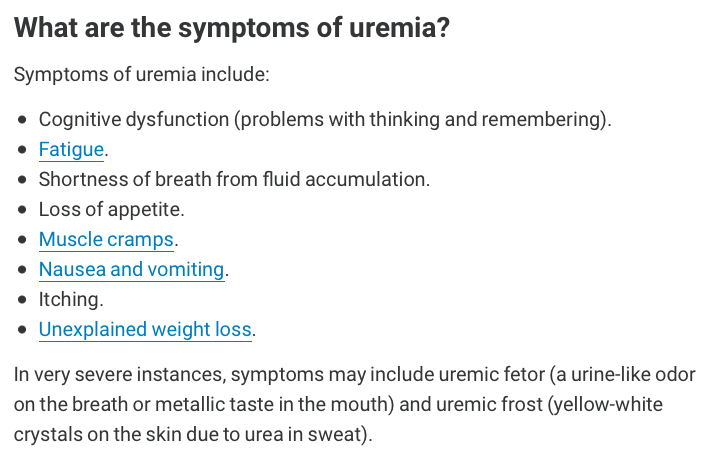
Source: Cleveland Clinic
This possibly explained why my psoriasis had gotten worse when I ate a whole foods plant based vegan diet the last go-round. As shown above, that time also I ate large amounts of whole legumes daily, and may have consumed excessive amounts of water. Further, my diet contained very large amounts of fruits and relatively low amounts of whole grains. Even during my macrobiotic days I had typically eaten 1-2 cups of beans or a similar serving of tofu or tempeh daily, except during periods that I had done a more restricted healing diet, when my skin had improved. I had just failed to notice that restricting protein-rich plant foods had improved my skin (I was not sure). Like so many others, I have been programmed by the purveyors of animal protein to be worried about getting enough protein and essential amino acids, resulting in consuming way more than my body can detoxify, whether I was eating animals or not.
Reducing Total Protein Intake Improves My Psoriasis
After these realizations, for a period I cut my total plant protein intake down closer to about 0.8 to 1.0 g/kg per day, 0.8 g/kg being the Recommended Dietary Allowance (RDA) and above the estimated average requirement (EAR) of 0.65 g/kg per day (more about this below). I did this by reducing legume and legume product intake. Whereas I previously ate 1-2 cups of whole legumes daily, during this period I didn't even eat legumes every day, when I did I typically ate less than half a cup, and I typically consumed only the most digestible beans, namely aduki, mung, garbanzo (chickpea), black soy, lentils, and green or yellow peas. Whereas I previously consumed 8 ounces of tofu on most days, during this period I ate tofu less often and generally not more than 4 ounces at a time. Whereas I previously consumed 28-56 g (1-2 scoops) of soy or pea protein isolate nearly every day, during this period I rarely had either, and if I did, I generally had only 8-15 g (one or two tablespoons) at a time. I got most of my protein from whole grains.
Further, whereas I previously consumed 1-2 liters of water or beverages on top of my food intake, I reduced beverages to 1-2 cups daily, unless true thirst called for more. I get plenty of water from the whole plant foods that I eat.
As a result, I saw significant improvement in my skin, although I can't be certain that the diet change was the sole cause of the improvement.
For reference, here's a collage of photos of the lesion in my left ear, which was almost always the worst, after my last 5+ years on a vegan diet, and during my hypercarnivore daze:
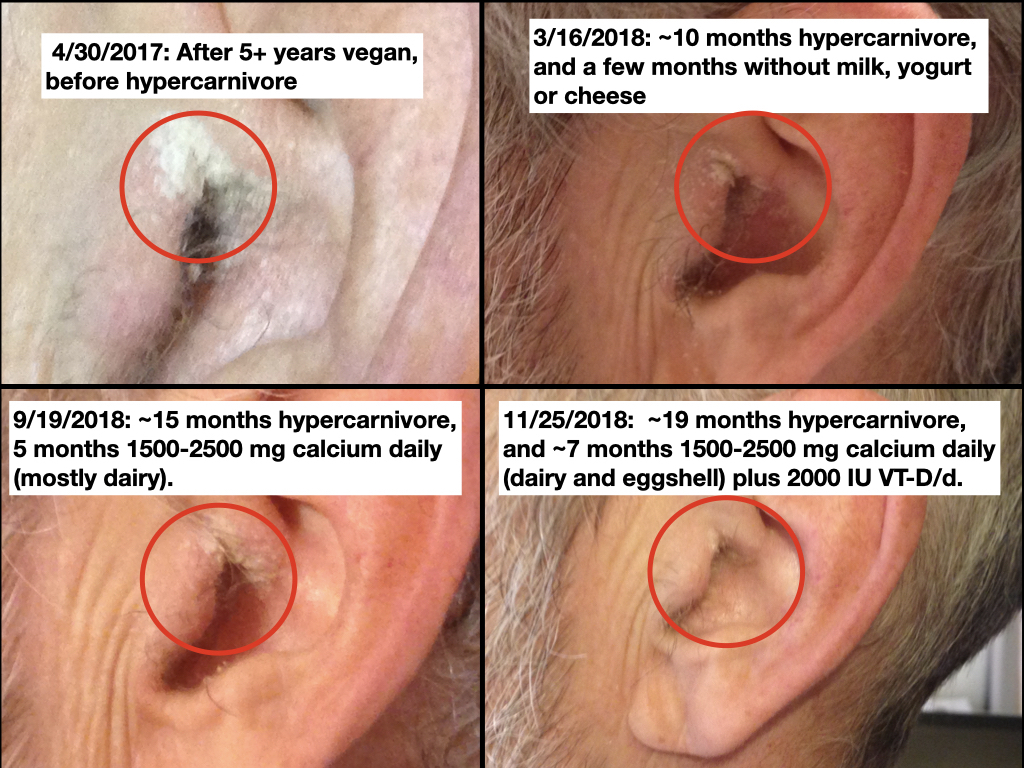
As shown, although the hypercarnivore iterations produced some modest improvements, the ear still cracked and peeled. It improved when I ate less beef and high fat dairy and included fruits (the "meats & sweets" iteration). Now that I have much better results (shown below) eating a lower yet adequate protein whole foods plant based diet, I think that the modest improvements I had after switching to an animal-based diet may not have been due to replacing plant foods with animal protein and fat, but because I cut out legumes altogether, thereby avoiding their drying and wind-inducing effects.
On the next slide, the left photo shows the same left ear when I was on an animal-based high-protein high-fat diet in 2021, while the right photo shows the same ear after 10 months without animal products; during the first ~7 months I ate a high-protein whole foods plant-based diet, and the lesions actually got worse (not 100% sure why); but after only about 3 months on a more normal 10-15% protein, low (10-15%) fat vegan diet and drinking according to thirst, the skin is better than ever.
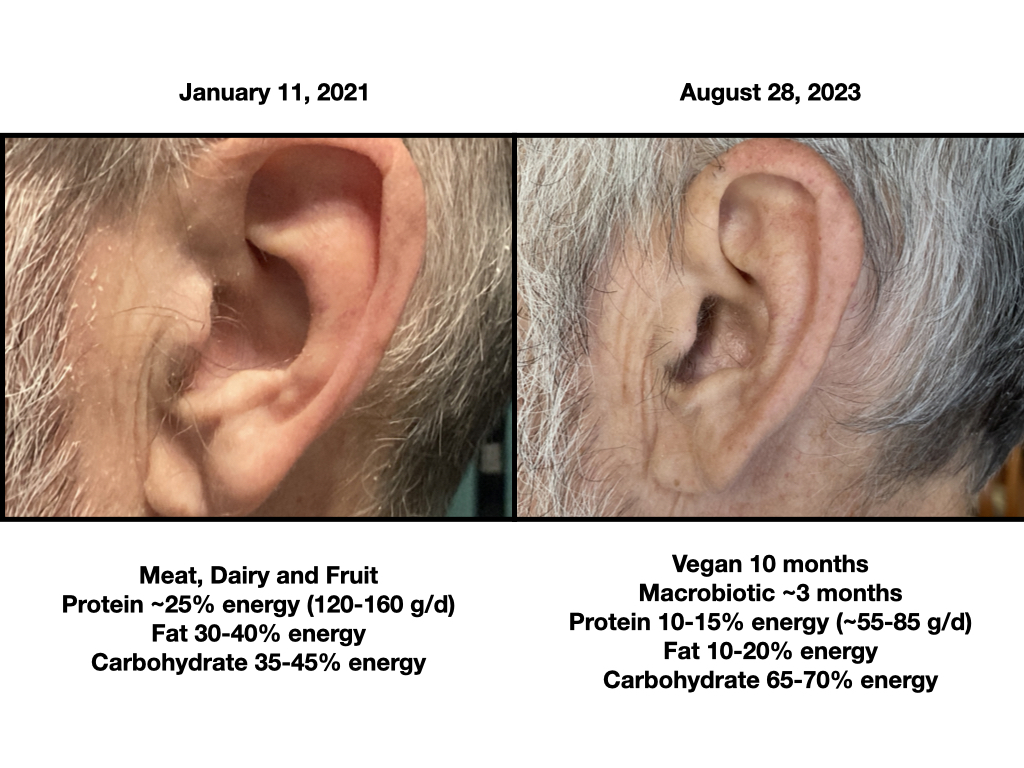
The skin integrity and tone are far better in 2023.
Here's the right ear comparison.
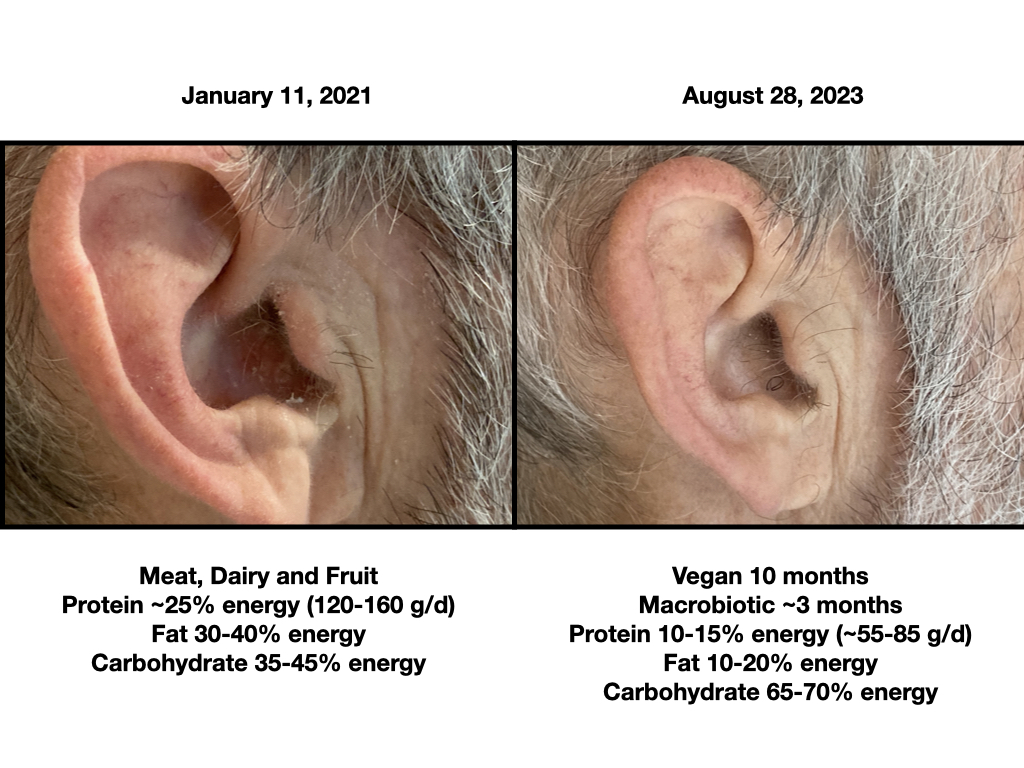
Notice that there was significant flaking inside the right ear in 2021 when I took the photo on the left, when I was eating a high-protein, high-fat, meat, dairy, and fruit diet, along with an excess of fluids from coffee and other beverages. All of that is gone in August 2023. Three months of eating a vegan diet with a total protein intake closer to the RDA and drinking fluids only when thirsty seemed to work wonders.
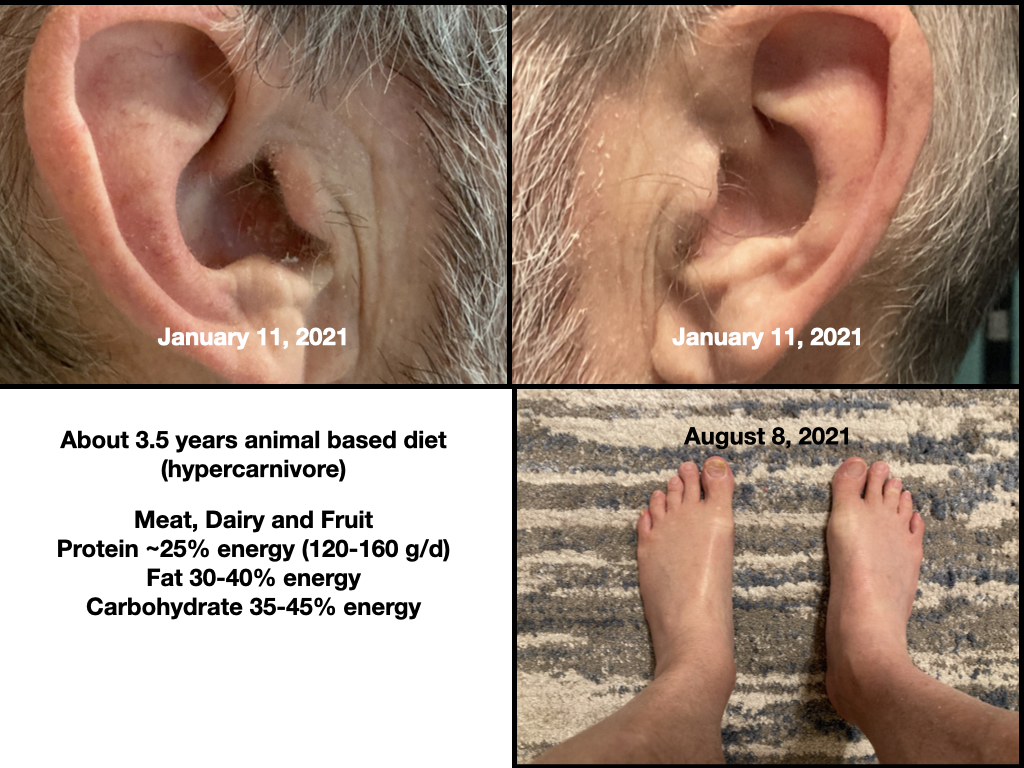
Further, when I was eating that hypercarnivore diet, I also had the lower limb edema, another sign of compromised kidney function. The body is one whole integrated unit; when there is a problem in one place in the body, that problem will be reflected throughout the body, typically in tissues that are related embryologically. If any part of your body is sick, your whole body is sick.
These photos show my scalp psoriasis over the past 6+ years.
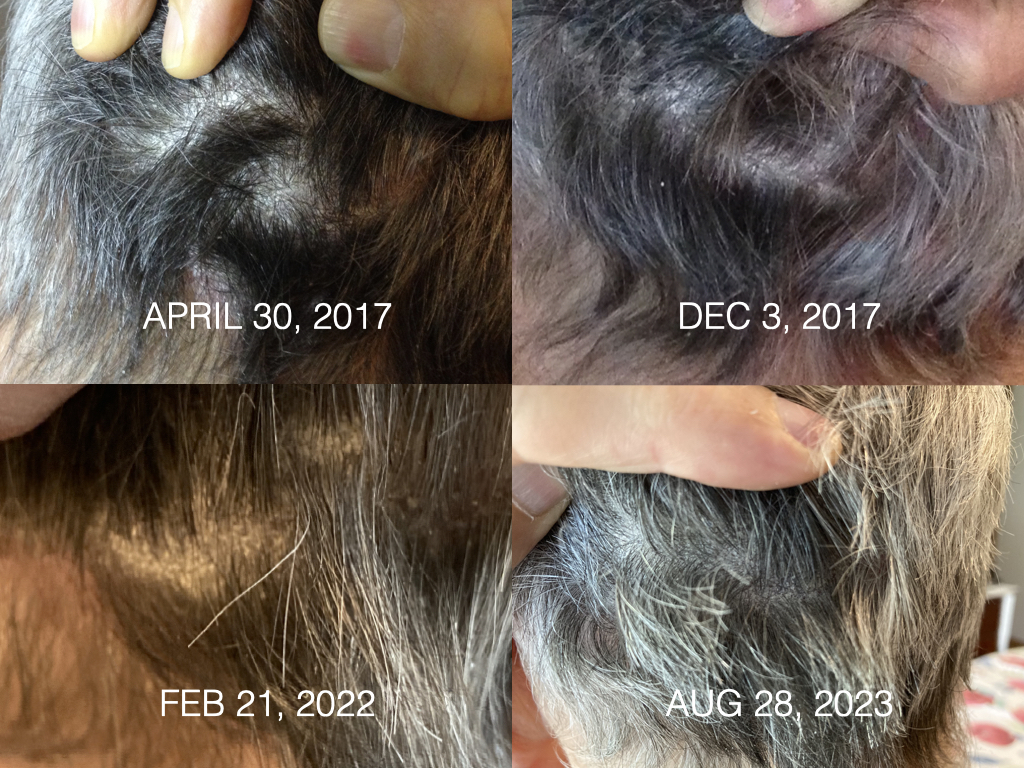
As shown, between April 2017 and February 2022 there was not improvement; if anything, it was worse (larger flakes, more itching) in 2022, after 5 years on an animal-based diet, than it was in April 2017. Therefore, I expect this will change slowly if at all. I am unsure how much change I have seen in this since reducing my total protein intake; I've only sustained this for a few months. Tracy says I don't scratch the area nearly as much as I did previously. I notice less itching and less skin flaking onto my shoulders, and from the photos I have taken it seems the flakes may be somewhat smaller.
[Update 10/24/23: Sometime after I published this post I remembered that during my 'hypercarnivore' and 'meats and sweets' daze the flaking on my scalp had actually spread towards the top and front of my head. That flaking stopped sometime during the period when I reduced my protein intake, so the scalp definitely improved.]
According to macrobiotic medicine, this flaking is a result of my body doing its best to deal with large excesses of protein and fat I previously consumed. Skin is composed of protein and fat. Shedding skin is therefore shedding of excess protein and fat, a direct external sign that one is consuming excess protein and fat. Since I consumed amounts of protein and fat that exceeded the amount I could discharge through normal elimination channels (perspiration, expiration, urination, defecation, growth and activity) for many years, some of the excess has accumulated in specific areas, and my body has resorted to pushing the excess out through the skin. Basically this particular area has accelerated exfoliation.
Accordingly, although I am no longer eating a large excess protein daily, I can expect to continue discharging the excess protein and fat that has built up in my skin through shedding some excess skin for some unknown period of time. To facilitate recovery of normal skin function I have resumed daily dry skin brushing to exfoliate skin all over my body. This increases over my entire skin surface, taking some of the pressure off the most congested area on my scalp.
The Protein Myth
Almost no-one in modern industrialized nations is suffering from a protein deficiency, yet almost everyone is worried about getting enough protein. People who engage in resistance or endurance training are especially prone to such worry, despite decades of research showing that trained athletes do not have elevated protein requirements and can meet their needs without any special focus on protein-dense foods. Athletes simply eat more food, and, so long as they eat whole foods, they will consume all the protein they need in proportion to their energy expenditures. This has been proven by dozens of research projects, except those funded by enterprises seeking to market high protein animal foods or protein supplements.
As I wrote in Powered By Plants, many well-controlled experiments have determined that humans generally require only about 0.65 g/kg bodyweight as protein, and that 0.8 g/kg bodyweight will cover the needs of 98 percent of the population. The Food and Nutrition Board of the National Academy of Sciences has stated:
“Available evidence does not support recommending a separate protein requirement for individuals who consume complementary mixtures of plant proteins.”[pages 661-62]
On this basis the average 70 kg (154 lb.) man or 55 kg (121 lb.) woman consuming a plant-based diet would require only 56 g or 44 g of daily dietary plant protein, respectively. Given that a 70 kg physically active male will expend and consume about 3000 kcal daily, he needs no more than 10% of his energy intake as protein. Studies show that vegans eating varied diets based on cooked foods typically consume 13% of calories as protein. A male consuming 3000 kcal per day with 13% from protein would consume 98 g of protein, amounting to 1.4 g/kg.
Further, the Food and Nutrition Board of the National Academies found no compelling evidence for a higher protein requirement for physically active individuals, and stated:
“In view of the lack of compelling evidence to the contrary, no additional dietary protein is suggested for healthy adults who undertake resistance or endurance exercise.”[page 661]
Here are the receipts:
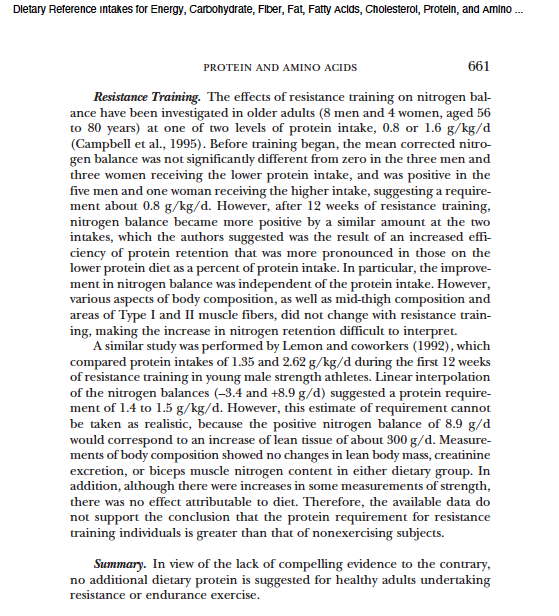
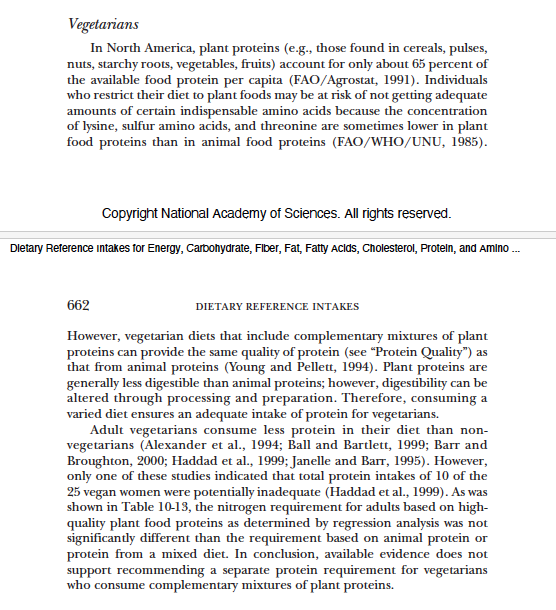
If the Food and Nutrition Board is correct, our obsession with protein, particularly animal protein, has no scientific basis. Rather, it is instilled and perpetuated by relentless marketing campaigns of those involved in producing high-protein animal products and supplements.
Despite getting correct information decades ago, it took me decades to break free of this myth. I still have to be on guard against falling for it again. Hopefully my experience will help others avoid that waste of time.
Recent Articles
-
Ancient Roman Soldier Diet
Apr 14, 25 05:19 PM
A discussion of the ancient Roman soldier diet, its staple foods and nutritional value, and a vegan minimalist version. -
High Protein Chocolate Tofu Pudding
Jul 01, 24 12:41 PM
A delicious high protein chocolate tofu pudding. -
Vegan Macrobiotic Diet For Psoriasis
Sep 05, 23 06:36 PM
Vegan macrobiotic diet for psoriasis. My progress healing psoriasis with a vegan macrobiotic diet. -
How Every Disease Develops
Aug 04, 23 06:22 PM
How every disease develops over time, according to macrobiotic medicine. -
Why Do People Quit Being Vegan?
Jun 28, 23 08:04 PM
Why do people quit being vegan? How peer pressure and ego conspire against vegans. -
Powered By Plants
Mar 16, 23 08:01 PM
Powered By Plants is a book in which I have presented a lot of scientific evidence that humans are designed by Nature for a whole foods plant-based diet. -
Carnism Versus Libertarianism
Dec 30, 22 01:55 PM
Carnism Versus Libertarianism is an e-book demonstrating that carnism is in principle incompatible with libertarianism, voluntaryism, and anarchism. -
The Most Dangerous Superstition Book Review
Nov 15, 22 08:46 PM
Review of the book The Most Dangerous Superstition by Larken Rose.


